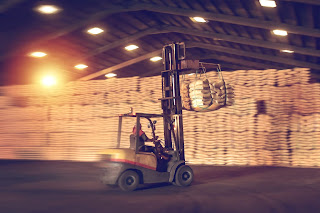5 trends that are shaping the future of material handling
Initially, when the idea of the warehouse came into effect, they were only being used as a simple storage space for manufactured and packaged goods ready for dispatch. Today, warehouses have become highly complex and sophisticated storage environments for various types of materials, assets and goods. Along with that, material handling has also evolved in parallel to even greater heights.
Material handling these days happens in a highly meticulous fashion with real-time updates and advanced command prompts using computers. Various material handling equipment like an Electric Tow truck, pallet truck or a jack, have become extremely agile and swift in terms of operation capability, in order to accommodate complicated handling tasks. But that was just the beginning. The future of smart warehouses and material handling seems brighter than ever before.
With rapid advancements in technologies and the invention of smarter communication hardware, warehouses are being transformed into highly interconnected ecosystems that enable hundreds and thousands of large-scale material handling tasks to be carried out simultaneously. These technology trends are finding new applications in every business vertical and are becoming more and more adaptable in existing infrastructures. These trends will play a major role in the development of smart warehouses in the coming years.
Here are 5 trends that are shaping the future of material handling:
1.Big Data (Analytics)
The concept of Big Data is to transcend the ordinary processing limits of existing databases, and this has opened up a plethora of opportunities to develop system and platforms that are capable of computing large chunks of raw and data and rendering insightful data that can help optimize schedules and delivery timelines
2. Internet of Things:
IoT technology is taking the manufacturing space by storm. Enhanced connectivity, accurate movement detection and detailed monitoring are some of the major benefits that have come to light with the help of IoT. In a warehouse ecosystem, the Internet of Things will support communication and coordination across conveyors, automated storage and retrieval systems, forklifts, and other systems via a range of embedded or retrofitted Bluetooth sensors/beacons, to enable new levels of visibility and automation.
3. Mobile Technology:
Handheld devices are really getting it going for the floor workers. Smartphones and tablets are paving the way for advanced situation assessments from remote sites. The entire workflow of the process, along with delivery timelines and schedules can be reviewed on mobile devices, enabling real-time updates and faster actions. They are also enhancing worker safety.
4. Superior Energy Sources:
Renewable energy has been showing highly promising results since the past few years. The large flat top roofs of warehouses are ideal for solar panel installations due to which, major portions of total energy requirements can be fulfilled via solar. With the advancements in energy regenerative and storage technologies, energy optimization has gotten even better. Material handling equipment these days can also run on clean energy as lithium-ion batteries and lead-acid batteries have become powerful enough to fuel equipment all day long. Some examples of the equipment are Electric stacker and battery forklift.
5. E-commerce:
This has been a major influencer in the digital transformation of the warehousing industry. Over the years, we have witnessed a dramatic shift in consumer attitude. It’s all about on-demand fulfilments these days as people don’t like waiting long. Ecommerce has helped set up and streamline a meticulous structure that allows for rapid management, distribution and delivery of goods. Ecommerce has fostered the use and invention of cutting-edge technologies and online platforms, to match up to the consumer demand goals and standards.
Being at the core of the warehousing landscape, material handling is bound to undergo rapid technology upgrades and witness even bigger revolutions in the decades to come. The future of material handling has just begun and the above 5 trends are today, at the forefront of innovation in this industry.
Linde India is a pioneer in Material handling equipment & Warehouse Equipment. Industrial trucks by Linde; whether diesel lift trucks, electric forklifttrucks or warehouse handling equipment, stand out because of their innovative technology aimed at greater cost-effectiveness in logistics. Linde Material Handling offers expertise in material flow and carefully conceived functionality combined with maximum economy. If you are looking material handling equipment dealers or prices in India, you should definitely check out their website- lindemhe.com

Comments
Post a Comment